May 16, 2025 | 10:37 GMT +7
May 16, 2025 | 10:37 GMT +7
Hotline: 0913.378.918
May 16, 2025 | 10:37 GMT +7
Hotline: 0913.378.918
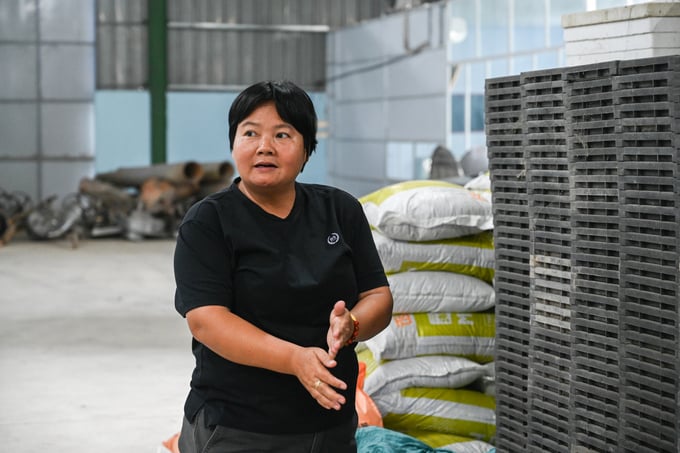
Ms. Dao Thi Nhu He, Director of Saigon Kim Hong Company, was the first person to bring direct seeding machines to Vietnam. Photo: Quynh Chi.
Ms. He's journey into agriculture was not merely a career choice but stemmed from the challenges her family faced in their farming endeavors. Reflecting on her parents' laborious efforts, particularly during the arduous task of harvesting rice and preparing it for the buffaloes, Ms. He resolved to alleviate their struggles by importing three harvesters for home use.
However, witnessing the transformative impact of machinery on farming practices ignited a deeper passion within Ms. He. Encouraged by the support of her family and friends, she embarked on a journey to pursue a career in agriculture, driven by her innate creativity and unwavering determination.
In 2008, Saigon Kim Hong Trading Service Company Limited was founded, marking the inception of Ms. He's entrepreneurial endeavors. In addition to importing combined harvesters, she expanded her business to include transplanting machines, catering to the agricultural needs of Northern provinces. Despite the substantial investment required for a transplanting machine line—approximately 800-900 million VND—and the demanding nature of post-transplantation care, Ms. He remained undeterred in her pursuit of innovation.
However, transitioning to a service-based transplantation model in 2012 posed its own set of challenges, fraught with setbacks and financial losses. Ms. He candidly shared her struggles, recounting the skepticism from farmers regarding sparse planting resulting from mechanization. Despite facing adversity and enduring hardships, including sleeping in the fields during cold nights to tend to the seedlings, Ms. He remained resolute in her commitment to agriculture.
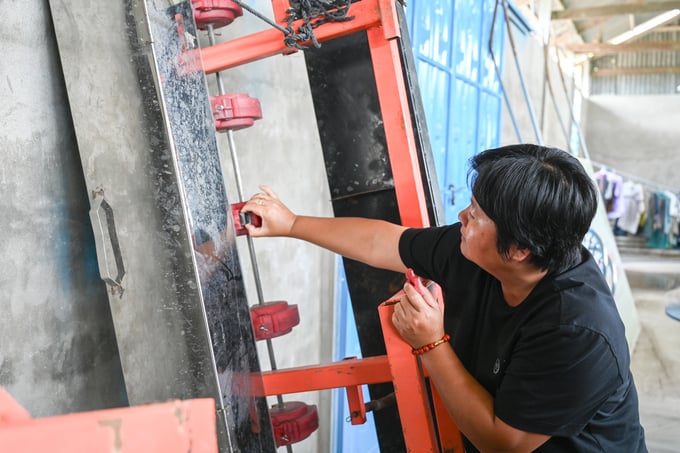
Ms. Nhu He is self-taught, gaining experience from her work and the farmers she works with.
Yet, amidst the toil and setbacks, a moment of doubt crept in, prompting Ms. He to contemplate abandoning her agricultural endeavors. However, her indomitable spirit and unwavering resolve propelled her forward, driving her to persevere through the challenges and uncertainties that beset her path.
The introduction of mechanized sowing in rice production heralds numerous advantages and is hailed as a transformative factor in the landscape of rice cultivation, according to the Department of Crop Production (Ministry of Agriculture and Rural Development) and industry experts. Mechanized seeding machines ensure even distribution, with 5-7 seeds per cluster in the winter-spring crop and 8-10 seeds per cluster in the summer-autumn crop. On average, mechanized direct seeding slashes seed usage by 50-60%, utilizing only 40-60kg/ha compared to traditional broadcasting methods requiring 120-150kg/ha.
The reduction in seed usage not only yields economic efficiencies but also curtails accompanying costs for agricultural inputs such as inorganic fertilizers and pesticides. Moreover, protein consumption diminishes by 10-20% compared to conventional practices. In the Mekong Delta, where farmers habitually apply plant protection chemicals 5-7 times per crop, mechanized direct seeding reduces the necessity to merely 2-3 applications per crop. These advantages culminate in increased rice productivity, robust plant health, minimized soil degradation, and diminished greenhouse gas emissions.
Nevertheless, the initial reception to mechanized seeders in early 2019 was tepid, marked by widespread skepticism among farmers. Ms. He recounted instances where farmers, upon observing the sparse seeding by the machine, hurriedly resorted to manual sowing out of apprehension of potential revenue loss. Undeterred by these challenges, Ms. He, characterized by her tenacious spirit, persevered in her efforts to promote the adoption of this innovative technology, despite encountering occasional setbacks and disappointments.
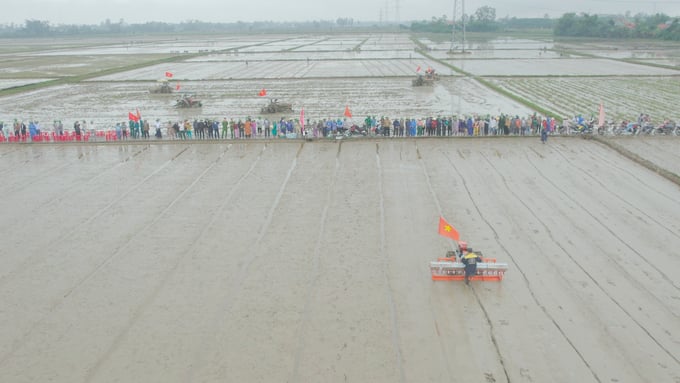
Saigon Kim Hong organized a demonstration of direct seeding machines in Ca field (Tra Kieu Tay, Duy Son, Quang Nam). Photo: Quang Nam Newspaper.
To win over farmers, Saigon Kim Hong diligently conducted demonstrations in fields across numerous localities, despite not always receiving a warm reception to the new technology. Even amid the adversities posed by the Covid-19 pandemic, Ms. He's small business has stood resilient, expanding its operational scope. In early 2020, Saigon Kim Hong partnered with the National Agricultural Extension Center and Binh Dien Fertilizer Joint Stock Company to deploy 60 "Smart rice farming" models across various localities in the Mekong Delta, underscoring Ms. He's unwavering commitment to driving agricultural innovation and sustainable practices.
Ms. Nhu He noted a significant shift in farmers' attitudes over time. Previously, the failure she encountered stemmed from farmers' skepticism, evidenced by their inclination to manually sow additional seeds after witnessing the sparse distribution facilitated by the seeding machine. Initially, they questioned the profitability of such sparse sowing practices. However, as awareness and understanding have evolved, farmers now grasp the benefits of cluster seeding machines, with some even critiquing the density of the sowing.
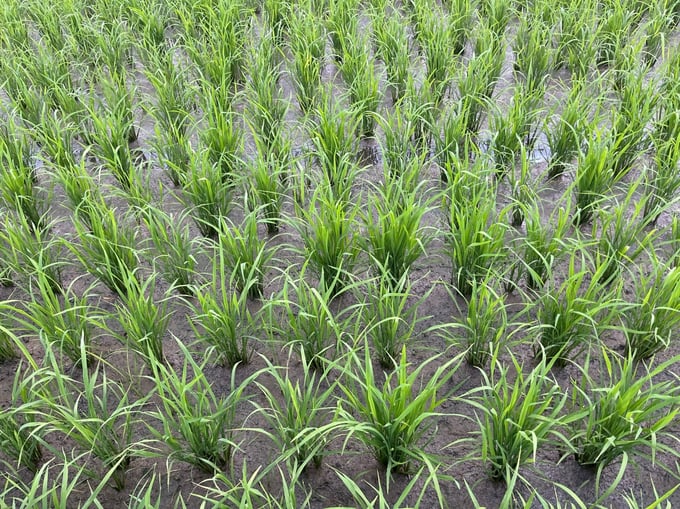
Rice clusters in Vong Dong, Thoai Son, An Giang.
On another occasion, a farmer reached out to Ms. He seeking guidance on operating the seeder. Through a phone conversation, she provided assistance, resolving the issue to the farmer's satisfaction, which elicited joy and gratitude from the individual. Such instances of direct engagement with the farming community not only foster trust but also serve as a source of motivation for Saigon Kim Hong to persist in its developmental endeavors.
Ms. He emphasized the importance of these interactions in cultivating trust within the community, underscoring their pivotal role in driving Saigon Kim Hong's ongoing development initiatives. This direct engagement not only enhances understanding but also fosters a sense of partnership and collaboration between the company and the farming community, ultimately contributing to the advancement of agricultural practices in Vietnam.
Ms. Nhu He conducted a swift economic analysis, revealing the substantial benefits of mechanization. By saving approximately 60kg of seeds per hectare compared to traditional methods, mechanization offers significant cost savings. In the initial year of implementing the 1-million-hectare high-quality, low-emission rice program in the Mekong Delta, consolidating and mechanizing the entire 180,000-hectare VnSAT Project area could lead to substantial seed cost reductions. With the current average seed price of approximately 16,000 VND/kg, this translates to approximately 173 billion VND in total savings. With around 41,000 households participating in the VnSAT Project, each household stands to save an average of 4.2 million VND in seed costs in the first year alone.
Additionally, mechanization presents opportunities for reducing fertilizer and pesticide costs, freeing up capital for investment in high-tech machinery. Discussing future plans for machine production, Ms. Nhu He outlined strategies to address post-harvest rice losses.
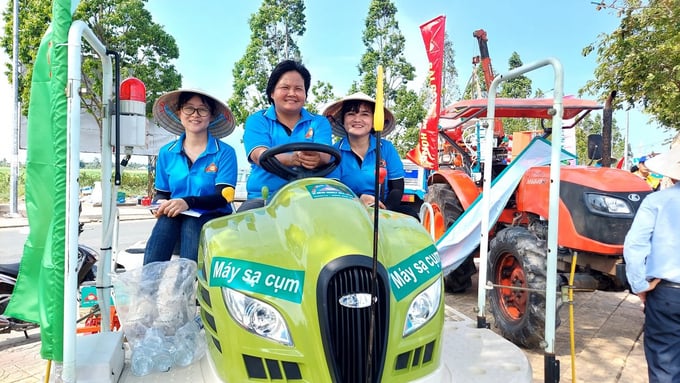
In addition to direct rice seeders, Saigon Kim Hong is developing more farmer-friendly equipment.
Recognizing the suboptimal performance of many combine harvesters in Mekong Delta conditions, Saigon Kim Hong's mechanical group plans to import harvesters capable of cutting close to the roots and removing rice plant tops. Another focus is on compact, portable, and cost-effective mini dryers for individual farmers. These machines can be conveniently placed at field edges, enabling early processing of harvested rice and extending storage times by 2-3 days. Alternatively, mobile dryers designed to be compact and lightweight can fit onto rice boats, facilitating on-site rice processing before transportation to processing plants.
Ms. He articulated the vision that mini dryer equipment will empower farmers to take control of the drying process, reducing dependency on traders and businesses. With ongoing improvements, she envisions a future where the lives of rice growers are enriched, production is enhanced, and modern mechanization alleviates agricultural hardships.
Translated by Quynh Chi

(VAN) Cold-barn systems efficiently manage environmental and temperature conditions, which aids in the prevention of respiratory diseases in pigs and protects them from the vectors that transmit African swine fevers.

(VAN) To tackle challenges, the project 'Addressing key technical bottlenecks in the grouper supply chain in Vietnam' has been underway since 2024.

(VAN) The project 'Disease-Resilient and Sustainable Cassava Production Systems in the Mekong Region', funded by the Australian Center for International Agricultural Research (ACIAR), is being implemented from 2024 to 2028.

(VAN) Data from 10,000 farming households will help professionalize production organization and support the implementation of the One Million Hectares Program for High-Quality, Low-Emission Rice Cultivation.

(VAN) FAO Director-General QU Dongyu marks International Day of Plant Health at NENA conference.

(VAN) Deputy Minister of Agriculture and Environment Hoang Trung affirmed that floriculture and ornamental plants are a growing industry that receives significant global attention.

(VAN) The three staple crops dominating modern diets – corn, rice and wheat – are familiar to Americans. However, fourth place is held by a dark horse: cassava.